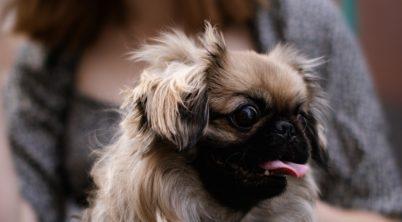Table of Contents
Uncovering the Causes of Appetite Loss
Pekingese dogs may experience a loss of appetite for various reasons, ranging from minor to significant health concerns. Loss of appetite in these dogs can be attributed to environmental stressors, such as moving to a new home or changes within the household that disrupt their familiar routines. These small but significant alterations in their environment may cause stress, which in turn affects their willingness to eat.
Additionally, oral health issues are a common cause for a Pekingese not eating. Dental problems including periodontal disease, infected teeth, and broken teeth can cause pain, making it uncomfortable for them to chew their food. A Pekingese with a decreased appetite may be suffering from discomfort due to one of these conditions. Observing for other signs of illness, such as changes in behavior, fever, or vomiting, is crucial as they can indicate an underlying health issue that requires immediate attention.
It is important for owners to closely monitor their Pekingese’s eating habits and seek veterinary advice if a loss of appetite persists. Identifying the cause is the first step to restoring their appetite and ensuring their overall health and well-being. Regular check-ups, maintaining good dental hygiene, and a stable environment can help prevent appetite issues in these sensitive dogs.
Common Health Issues in Pekingeses
Pekingeses are known for their distinctive looks and loyal temperament, but like all breeds, they’re prone to certain health conditions that could affect their appetite.
Dental Problems and Diseases
Pekingese dogs often suffer from dental issues due to their small mouths and overcrowded teeth. Common dental diseases include periodontal disease, which could lead to tooth pain, and loss, making it difficult for them to eat. Symptoms of dental problems may include halitosis (bad breath), visible tartar, reluctance to chew, or pawing at the mouth. Regular dental check-ups are crucial in preventing and treating these conditions early.
Gastrointestinal Issues
These dogs may experience gastrointestinal problems that can result in vomiting and diarrhea, leading to a decrease in appetite. Potential causes include infections, allergies, and hypothyroidism. Gastrointestinal issues can range from acute to chronic conditions, and symptoms like vomiting or diarrhea should prompt a visit to the vet. Dietary management, along with appropriate medical intervention, often help manage these conditions.
Respiratory and Systemic Diseases
The Pekingese breed, being brachycephalic (having a broad, short skull), is susceptible to respiratory system difficulties. This can include problems like small nostrils, an elongated soft palate, or tracheal collapse, which can all cause breathing issues and a subsequent reduction in their desire to eat. Systemic diseases such as heart disease and intervertebral disk disease may also cause a loss of appetite. Weight management and proper care are key to preventing or managing these serious health concerns.
Diet and Nutrition
When it comes to a Pekingese’s health, the role of diet and nutrition cannot be overstated. Ensuring the right mix of nutrients in a Pekingese’s diet is essential for maintaining their overall well-being and preventing eating issues.
Importance of a Balanced Diet
A well-balanced diet for a Pekingese should comprise a mix of protein, carbohydrates, and fats, along with essential vitamins and minerals. Protein sources like chicken provide the necessary amino acids, while carbohydrates should come from complex sources such as brown rice. Fats are crucial for energy, and yogurt can be a healthy addition that provides calcium and probiotics. It’s critical to ensure they have adequate water intake to maintain proper hydration and prevent gastrointestinal issues.
- Proteins: Chicken, lamb, fish
- Carbohydrates: Brown rice, sweet potatoes, oats
- Fats: Flaxseed oil, fish oil (in moderation)
- Water: Fresh and available at all times
Dealing With Picky Eaters
Some Pekingese may be picky eaters, showing a lack of interest in both wet and dry food. Introducing a variety of dog foods or adding palatable toppings to their meal can entice them to eat. However, it’s vital to avoid a poor diet consisting of excessive table scraps or unhealthy treats. For dogs with bad breath or those prone to upset stomach, a bland diet temporarily or consulting a veterinarian may be necessary.
- For picky eaters:
- Mix wet and dry food
- Introduce new proteins like chicken
- Add plain yogurt as a topping
Adjusting Diet for Aging Dogs
The nutritional needs of Pekingese can change as they age. Seniors may require fewer calories but more of certain nutrients, such as those supporting joint health. Switching to food formulated for senior dogs can ensure they receive a balanced diet without excess calories, which can lead to weight gain and associated health issues.
- Senior Dog Diet Adjustments:
- High-quality protein (lower quantity but easy to digest)
- Reduced-calorie diet
- Supplements as recommended by a vet (glucosamine, omega-3 fatty acids)
Behavioral Factors and Stress

Behavioral factors and stress in Pekingese can lead to a decreased appetite. These issues are often unnoticed but can significantly impact their eating habits.
Anxiety and Behavioral Changes
Stress and anxiety in Pekingese can manifest in several ways, including a loss of appetite. Factors that may contribute to anxiety include changes in the environment, such as moving to a new home, or alterations in their routine. If a Pekingese does not feel secure or is experiencing high levels of stress, they may express this discomfort by refusing to eat.
Behavioral changes, such as decreased interaction with their owners or a reluctance to exercise, may also indicate that a Pekingese is under stress. A lack of physical activity can aggravate stress, and in turn, stress can reduce the motivation to move, creating a cyclical problem that can lead to obesity or depression. Moreover, dogs that do not receive enough rest due to anxiety may show a loss of appetite.
It’s crucial to observe a Pekingese for signs of anxiety and behavioral changes that could point to stress-related eating issues. Addressing these factors may involve providing a stable environment, ensuring regular exercise, and allowing ample rest. If these conditions persist, a consultation with a veterinarian or an animal behaviorist may be necessary to identify the root cause and develop a targeted strategy to help the Pekingese return to normal eating habits.
Routine Care and Prevention
Maintaining your Pekingese’s health involves routine care practices aimed at preventing common issues that may affect their appetite. Regular veterinary care, including vaccinations, as well as consistent dental hygiene and grooming, play a critical role in their overall well-being.
Regular Veterinary Visits and Vaccinations
Veterinarian Check-ups: Regular check-ups with a veterinarian are fundamental for early detection of health issues. A veterinarian can provide prompt diagnosis and treatment, including antibiotics if necessary, to address any underlying conditions affecting your Pekingese’s appetite.
- Vaccinations: Up-to-date vaccinations are crucial to prevent infectious diseases that can lead to loss of appetite.
- Early Detection: Routine blood tests and physical exams by a veterinarian are vital for the early detection of systemic issues, including those related to genetics which could impact your Pekingese’s eating habits.
Dental Hygiene and Grooming
Dental Health:
- Gum Disease: Gum disease is a common condition in Pekingese due to their brachycephalic facial structure. Regular dental check-ups can prevent dental issues that cause pain and hinder eating.
- Dental Hygiene: Establishing a dental hygiene routine that includes brushing teeth can reduce the risk of periodontal disease.
Grooming:
- Shedding and Skin Health: Consistent grooming is key to managing shedding and maintaining skin health, which contributes to overall wellness and prevents issues that may lead to a decrease in appetite.
- Drooling: While Pekingese are not known for excessive drooling, keeping the face clean during grooming can prevent any related discomfort that might deter them from eating.
Exercise: Adequate exercise supports digestive health and maintains regular appetite. Regular walks and playtime are necessary for the Pekingese’s physical health.
Identifying and Addressing Acute Conditions
When a Pekingese stops eating, it’s crucial to determine if an acute health condition is present. Acute conditions can manifest rapidly and may require prompt veterinary care to avoid escalation.
Recognizing Emergent Health Issues
Acute health issues in Pekingese may present as sudden loss of appetite, accompanied by other concerning symptoms such as vomiting, diarrhea, fever, or bleeding. Identifying signs of emergent health problems, such as a possible infection, pancreatitis, or inflammatory bowel disease, can manifest as acute sick symptoms. Owners should note the presence of eye problems, including cataracts, which, while not directly related to eating habits, may indicate broader health issues.
- Common Symptoms:
- Loss of appetite
- Vomiting
- Diarrhea
- Lethargy
- Fever
- Unexpected bleeding
- Behavioral changes
Prompt recognition of these symptoms can be pivotal for a Pekingese’s health, as conditions like an infection or inflammatory disease can escalate without timely intervention.
Immediate Actions and Veterinary Interventions
Immediate action should be taken if acute symptoms are observed. Owners should:
- Assess: Check for additional symptoms to relay to a veterinarian.
- Isolate: Prevent the sick Pekingese from interacting with other pets to avoid potential spread of infection.
- Consult: Contact a veterinarian immediately for advice or arrange for an urgent appointment.
Veterinary interventions may include:
- Diagnostic Tests: To investigate underlying causes such as infections or tumors.
- Treatment Plans: Could range from antibiotics for an infection to surgery for more severe conditions.
- Veterinary professionals might employ various therapies to address the acute condition, depending on the diagnosis. This could include administering fluid therapy for dehydration due to diarrhea or antiemetics to combat vomiting.
Owners should not delay when acute symptoms are evident, as such conditions may rapidly deteriorate. Suspicion of pancreatitis, which can cause intense abdominal pain and vomiting, or any serious disease, warrants immediate veterinary attention. Early diagnosis and treatment are essential for the best possible outcome.








